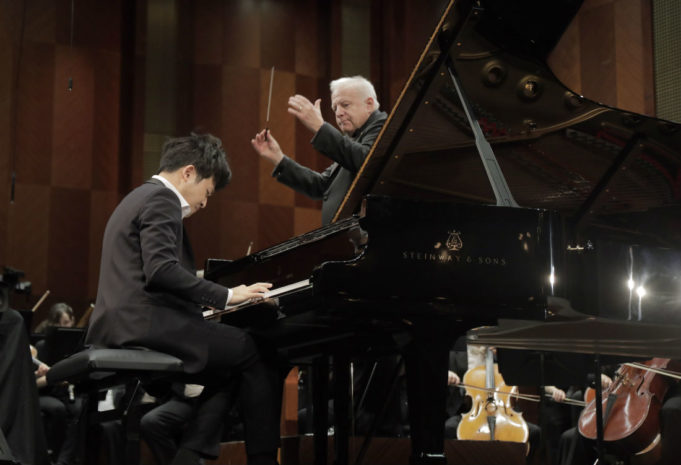And so we move on to the final concertos, the climax of the documentary film (if the Cliburn were making a documentary film about itself this year). Each of the six finalists is playing a different work this year. This is partly due to the fact that the competition has made its classical concerto a strictly Mozart affair, leaving some of the contestants free to select Beethoven or Chopin for their final concerto instead of the usual warhorses. We’ll hear one of those tomorrow, but still I remain disappointed that no one makes any left-field picks like Gershwin’s concerto or anything by Ravel, Bartók, Shostakovich, or something even more obscure. Sure, the chestnuts are chestnuts because they’re reliable, but why not take a chance and make a piece your own without the ghosts of famous pianists past hanging over you?
Maestro Leonard Slatkin takes the podium for this round. He’s been more active at this year’s competition, serving as president of the jury as well, whereas four years ago he was just there to lead the orchestra. He’s had the intervening time to get to know the Fort Worth Symphony Orchestra in greater detail, and you can hear the difference, particularly in the rich sable sound that he draws from the ensemble during the two Rachmaninov works that we hear this evening.
First up is Yury Favorin with Prokofiev’s Second Concerto. This brawny work is right in Favorin’s strike zone, and the Muscovite mashes it. He takes the fast second movement at a frightening clip and copes easily with the heaving swell of the slow third movement. FWSO’s sound has a real bite to it here that serves the music. The outer movements are handled with all the bravura and machismo you’d expect from this pianist. It’s a commanding turn by Favorin.
Kenneth Broberg’s take on Rachmaninov’s Rhapsody on a Theme of Paganini is something finer, though. It’s a marvelous act of balance between the piece’s dramatic, powerful passages and its less-heralded qualities like its beauty, its humor, its delicate sequences of filigree work by the piano. Everything is in this performance, to the extent that I’m not inclined to complain too much about the phrasing on that famous Variation 18 being a bit mannered. The work’s theme-and-variations structure feels as certain as the laws of physics in Broberg’s hands, and the pianist complements the orchestra in a way that he didn’t with the quartet in the chamber music portion. This sounds like our winner here, though there’s still three more performances to come.
To see the glory of Broberg’s performance, look no further than Sunwoo Ye-kwon’s account of Rachmaninov’s Third Concerto that follows it. The Korean doesn’t play badly by any means, bringing the appropriate volume to the big moments and doing a particularly good job at picking out the first theme from the massive blocks of chords in the first-movement cadenza. Yet he’s prettily boring in the more lyrical parts of this piece like the fingerwork in the second movement. He fills out the exciting parts quite well, and if I hadn’t heard Broberg’s subtlety earlier, I might be fooled into thinking this was gold-medal quality. Alas, this performance reminds me of nothing so much as an actor portraying Hamlet who excels in the play’s fiery, physical scenes but delivers dull soliloquies. Ultimately, his rendition of this famously difficult work feels technically adroit but emotionally unrealized.
Tomorrow the final performances are given and people get awards. We’re just in time for some last-minute drama.













There is something magical about Rachmaninoff in the right hands.